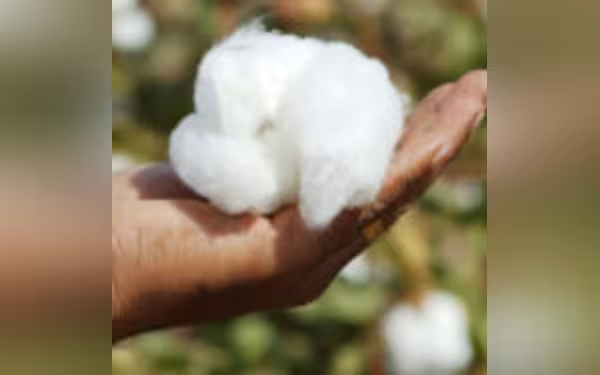Saturday, November 16, 2024 07:43 PM
R&D Vital for Cotton Sector in Pakistan's Climate Challenge
- R&D crucial for cotton amid climate change.
- Government support needed for research funding.
- Farmers' prosperity linked to innovative solutions.
 Image Credits: pakistantoday
Image Credits: pakistantodayResearch and development are essential for the cotton sector in Pakistan to combat climate change and ensure farmers' prosperity.
MULTAN: The significance of research and development (R&D) in the cotton sector has never been more critical, especially in the face of climate change. Cotton is not just a crop; it is the backbone of Pakistan's economy, providing livelihoods for millions of farmers and contributing significantly to the national income. As the world grapples with the effects of climate change, the need for innovative solutions in agriculture becomes paramount.
Dr. Muhammad Naveed Afzal, the Secretary of the Pakistan Central Cotton Committee and Director of the Central Cotton Research Institute (CCRI) in Multan, recently highlighted the importance of reducing production costs and increasing per-acre yield. He stated that these factors are central to a comprehensive strategy aimed at enhancing the prosperity of farmers. During a ceremony held to commemorate World Cotton Day at the CCRI, he emphasized that improving the seed sector and securing adequate funding for cotton research and development are essential steps in this process.
In an online address, Dr. Tasawar Hussain Malik, the Director of Research at the Pakistan Central Cotton Committee, echoed these sentiments. He pointed out that R&D is crucial for addressing the challenges posed by climate change. By advancing genetic seed technology and adopting modern farming methods, farmers can enhance productivity, lower their costs, and ultimately increase their income. This is not just about survival; it is about thriving in a changing environment.
Malik also urged the government to address the financial difficulties faced by research institutions. He believes that by providing the necessary support, agricultural scientists can develop climate-resilient and pest-resistant cotton varieties that will benefit farmers in the long run. The call for action is clear: without adequate funding and support for research, the future of cotton farming in Pakistan could be at risk.
Prominent farmer Ehsan Haq Laleka also weighed in on the discussion, underscoring the vital role of cotton in the economy. He urged the government to prioritize funding for research institutions, recognizing that the success of the cotton sector is intertwined with the well-being of farmers.
The future of cotton farming in Pakistan hinges on a robust commitment to research and development. As the climate continues to change, it is imperative that all stakeholders, including the government, research institutions, and farmers, work together to ensure a sustainable and prosperous future for the cotton industry. By investing in R&D, Pakistan can not only safeguard its cotton production but also enhance the livelihoods of countless farmers, ensuring that this vital sector continues to thrive.













